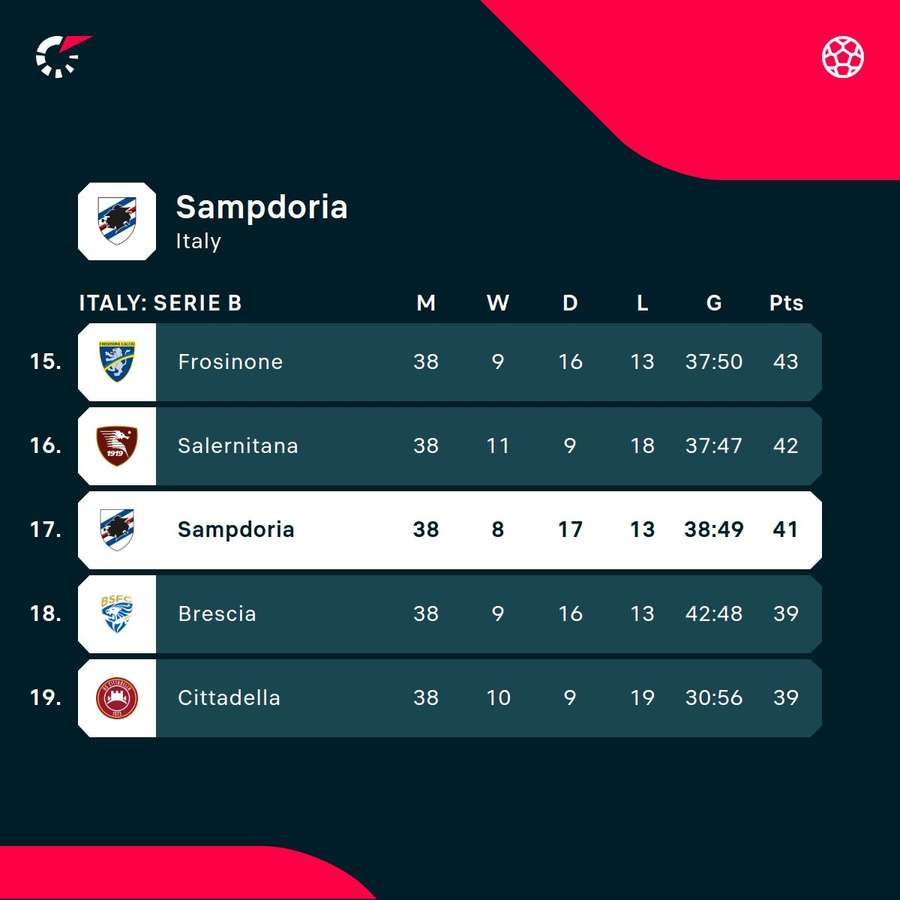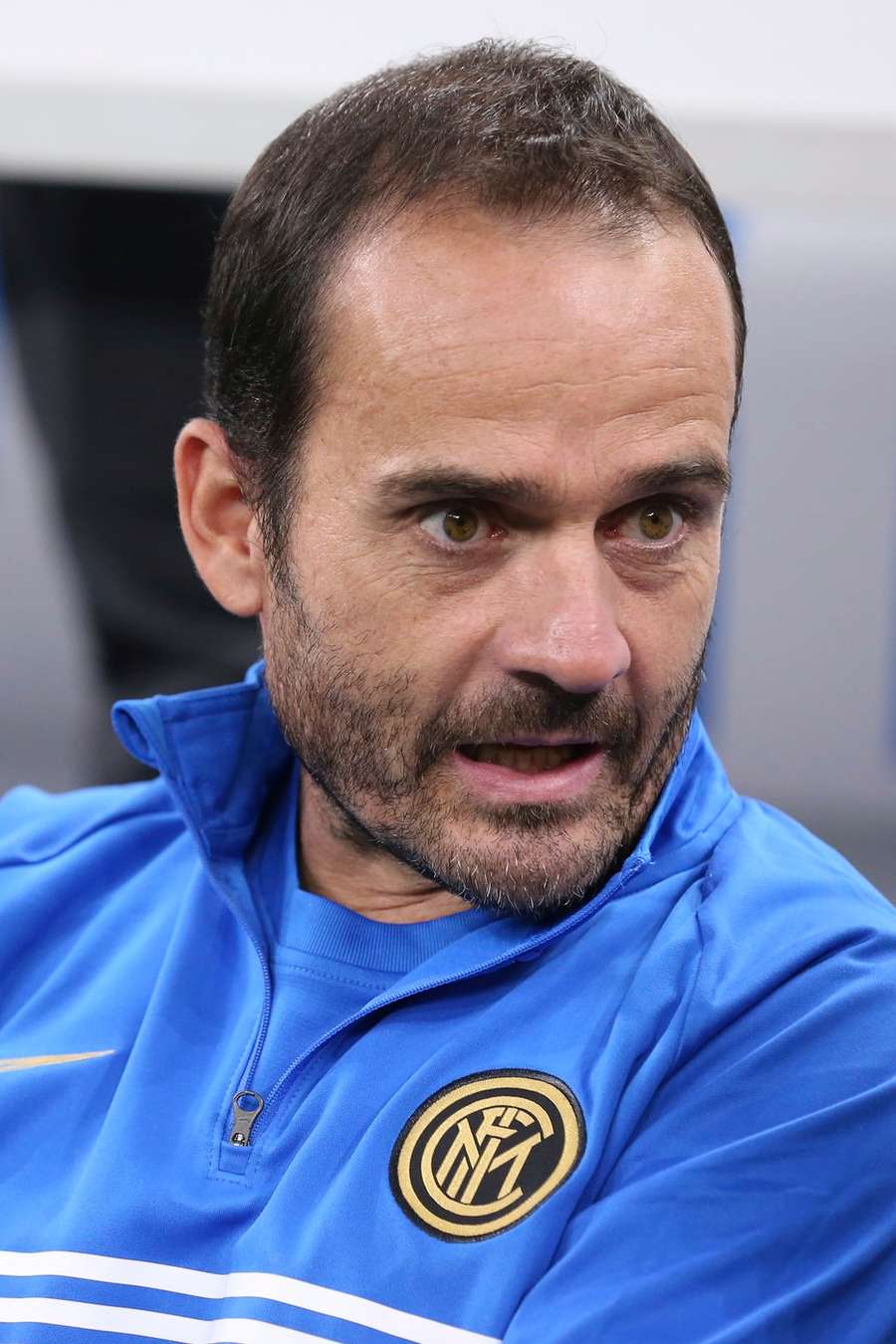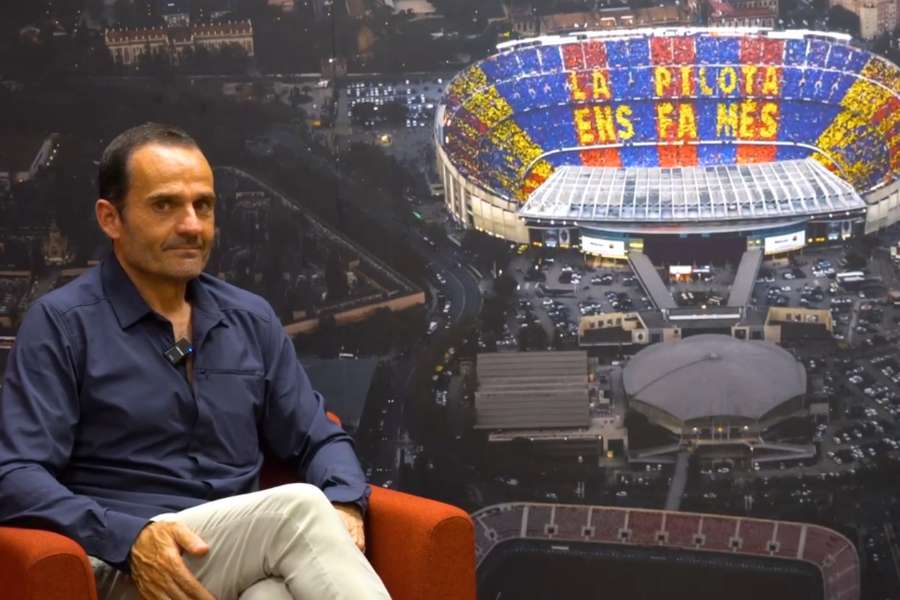You have had a very long career with many clubs, as well as the Italian national team. How does it feel to see Sampdoria in Serie C (the interview was done before Brescia's administrative relegation gave Sampdoria the chance to play in the playout for relegation against Salernitana)?
"It was very hard because I think everyone leaves their heart in all the places where they have worked, even if it could have gone half bad. The other day I was reading the article and I was in tears because I was thinking about that wonderful environment, Bogliasco and all the wonderful areas of Liguria towards the Cinque Terre and all this. And I said: 'My God, I mean, I can't believe that Sampdoria have gone down'.
Read the first part of the interview with Julio Tous here.
"And on top of that, of course, I was friends with the physical trainer, who was Paolo Bertelli, who was with (Andrea) Pirlo at the beginning of the season. And of course, we had worked three, two, five, seven years together, and the friendship was very close. The truth is that it was a drama with Samp. It was a drama because for me, it was always a great club, and they treated me fantastically.
"And really, I have to tell you, it is the origin of all the subsequent journey, because there was the director Marotta, who later moved to Juve, and they took me to Juve and finally to Inter. So it was a curious thing. They acquired a working model that we started at Sampdoria. We passed it on to Juve from the beginning. Then I went to the national team with (Antonio) Conte.

"They developed it there, and then Marotta went from Juve to Inter, and now he is developing it at Inter. And it's funny that it's like a repeated success, isn't it? Because Sampdoria got him into UEFA at the time with very good results. Then, at Juve, he had the golden period of nine Scudetti in a row. And now Inter, well, I probably think they are the team of reference in Italy in recent years."
'My first year at Juve was the one in which I was under the most pressure'
You were with Antonio Conte at Juventus as well as the national team. What was it like working with him?
"The first jobs were not full-time, they were usually in pre-season to launch the job, and then I would go periodically.
"They were jobs that worked. They worked well, but you realise that it's not as good as being there every day and trying to solve every problem that comes up. Then I arrived at Juve and I met Conte, but we came separately because Conte had been, if I remember correctly, at Bari and had been at Atalanta.
"And he came back to Juve with terrible pressure because they had finished seventh twice in a row. Juve had been in the second division, and I remember the first year, let's see, I'm not going to say it was hell, but it's probably the moment in my career where I've felt the most pressure.
"You had to get results, and things had to go well no matter what. So, of course, for the coach, that pressure was very noticeable because he was a Juventino and it was the opportunity of a lifetime. So, of course, we had to deal with that somehow.
"But then there was another black swan that has never happened again, and that is to finish the season unbeaten. That never happened in Italy, and it was 43 games without defeat, and we only lost the cup final in Rome against Napoli. So, of course, when that happens, it softens everything and you forget about all the problems."
'I've never seen a celebration like that of my first Scudetto in Turin'
I can imagine the contrast of what must have been the pressure of the whole year, and then the final celebration or the complete turnaround.
"I've never seen a celebration like it. The one the other day (Napoli's win) was emotional, but what we experienced in Turin when they won the first Scudetto? I was totally shocked and overwhelmed. I mean, how the people took to the streets, because they had been, I think maybe 10 years without lifting a cup, because they had been taken away from them because of Calciopoli.
"So that was a liberation, an incredible catharsis. And well, of course, all of us were also liberated because it had been very hard, because we were, let's say, the underdog team, what they call in English the 'underdog'. And finally, it all ended well.
"What happened? That, in the end, was the spearhead for Juve to really change the team. They had a lot of world champions of their age. I remember Luca Toni, (Vincenzo) Iaquinta, Fabio Grosso, who didn't count for the coach, and then, well, they started to renew the team.
"Then, the second year (Paul) Pogba came, Arturo Vidal came at the end of the pre-season, the team was strengthened a lot, and then the icing on the cake of the three years we were there was having (Carlos) Tevez as a striker along with (Fernando) Llorente, who had an incredible season.
"If I remember correctly, I would say that Tevez scored 20 goals and Llorente 17 or 18. And that season was the icing on the cake because there were 102 points, which I don't think has ever been beaten again in the big leagues."
And there wasn't as much pressure as before? I mean, did you feel the change?
"It was a little bit softened. I mean, you're always going to have pressure with Conte, but really, compared to the first year, whew, post-traumatic stress. I remember that pre-season in Bardonecchia, it was as if we were under siege, full of tifosi, with a lot of tension, and you could feel the atmosphere. It was real pressure.
"And that's when I understood, I always say, after having experienced that, whatever comes my way will seem easy."
'The Premier League is different to other leagues'
From your time at Chelsea, I remember Victor Moses speaking very highly of you because of the great season you had...
"It was a wonderful experience because Chelsea is also a very special club and the Premier League is experienced a little bit differently from the other leagues where I worked. Because those pitches in the city centre are full of pubs around, with people celebrating, matches at 15:00, 16:00, I'm not saying everyone is drunk, but everyone is happy, and then after the match, they can celebrate, it's like a liturgy that gets you hooked.
"The atmosphere at Stamford Bridge was wonderful, and that helped a lot. So it was a very well-structured club, with an absolutely American model. In fact, the person in charge was actually a lawyer from New York with terrible experience. Bruce Buck was his name, and it was a company, an NBA franchise rather than a football team.

"We were able to intervene from the beginning with these players who were coming from a very peculiar situation.
"They had won the league two seasons before and won it well, with Mourinho, and the next season they had finished 10th. They had sacked Mourinho, Hiddink came in, and it had been a disaster. They were completely out of everything important for such a powerful club, and they were out of European competition. So we could focus on the league."
'That Chelsea team was a great squad'
"What's going on? When you train people of that level, systematically, every week is clean, you can have one or two days off. Everything is much easier. Then, obviously, in football, there are more variables, and there may be an opponent who is superior to you.
"But in that case, there was a great squad, with the best (Eden) Hazard, with Diego Costa. And let's imagine that Cesc Fabregas, who had a great season and gave, I think, 10 assists, was a substitute and played some games.
"(N'Golo) Kante, who was the best player in the league, (Nemanja) Matic, David Luiz in defence, Thibaut Courtois in goal. Well, it was a big squad. Then, we won the league with a big gap, and we reached the cup final, which we lost because of a penalty, which I thought was unfair. There was no VAR and we didn't win the double, but it was a fantastic year because we were able to intervene very well, because we had a clean week, and the players, for example, Victor Moses, worked very hard.
"You could do everything perfectly, with recovery times, with good workloads, and, when you have that quality, I think it's normal for those results to appear. Of course, with players of a lower level, it's very difficult at that level, because let's not forget that it was Guardiola's first season at City and Mourinho's first at United. And in principle, the league was between the two of them, and we won it.
You have also worked with the Italian national team, which is in a crisis at the moment after missing two World Cups. What's going on there?
"As always, it's very difficult to talk about this because we forget that Italy were also European champions. It's incredible, it's another, another black swan that nobody expected. Italy were European champions, and at least Chiellini and company walked away with that glory.
"We go back to the quality of the organic, the 2006 Italian team. If you go back to who was there, it's a great team. I had the opportunity to work with several of those world champions, and they were all people I knew from that team. They were extraordinary people from a personal point of view and as players.
"And I'm talking about (Gianluigi) Buffon, (Alessandro) Del Piero, Pirlo, (Andrea) Barzagli, Fabio Grosso and Luca, yes, Luca Toni, Iaquinta. I mean, I had all of them at some point, and they were guys that you were saying, now I understand why these guys became world champions.
"That national team was incredible. I remember the following years, I remember the first year of Juve, they won silver in the European Championship against Spain, Spain beat them 4-0, and they came back very upset because they saw that Spain had already gone, that they had made a breakthrough. But then they were able to beat Spain afterwards.
"In fact, when we were there, at the European Championship in France, we beat Spain with Italy, which was a bittersweet, enormous feeling for me. But also, of course, I was with that team, and they were players I had taken with me for five years, the backbone of the national team. So, the fact that they haven't had that continuity, I honestly put it down more to cycles, as has also happened with the Spanish national team."
'Conte is one of the biggest winners I have ever known'
And I ask you also about Conte, but what is he like? If you had to highlight something in particular about him, what would you say?
"Well, an irrepressible passion, above all, for football, for winning. In other words, he's one of the biggest winners I've ever known. And of course, all that uncontrolled passion, without filters, well, of course, it's not easy to live with it. But well, it's the same as always, when you win, well, in the end, you can do well. The day you lose, it's better to hide, right?
"But I think his career speaks for itself and what he has been able to achieve, especially in teams that nobody gave a penny for, I think it is very remarkable. And if you were to ask me for a word, it would be 'winner'. A winner, who is on the verge of the Scudetto (the interview was done before he won the Italian championship with Napoli).
Finally, who is Julio Tous? If you had to describe yourself, what would you say?
"Well, I don't know, I'm still trying to discover myself. But maybe I would say that despite my age and having had many loops in my life, disappointments and some bad experiences and so on, I've always wanted to move forward, and I don't think I've lost my enthusiasm.
"So, I think that is the driving force in the life of any professional or any person, to never lose enthusiasm and always be projecting forward.
"I, who have known many architects, one day they explained to me why there was such longevity in the architectural profession, and it is because they normally don't stop designing until they die. And there are many architects of the highest level who are still working at 95 years of age, and it is because they have a project.
"Having projects and wanting to do things, for me, that's the spice of life, and the day you don't have them, you're going to have a problem. So I consider myself an enthusiastic person who always wants to keep progressing and learning. Because I'm a very curious person, I like a lot of things, and I'm always hungry for knowledge."
